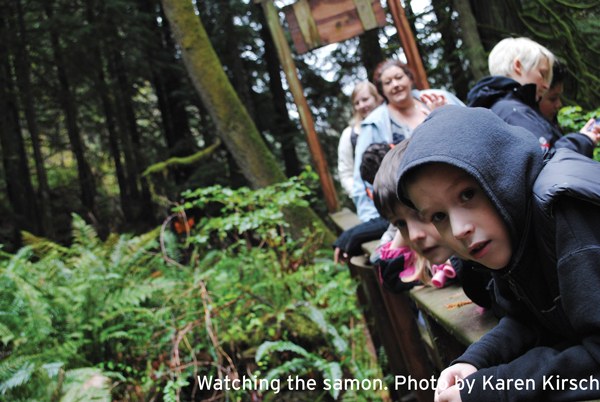
by Karen Kirsch
Walking down the steep switchbacks to the creek, I was startled by the sound of a herd of third graders yelling, “I see them! There they are!” I was being particularly careful to focus on the trail and keep a hold not only of my footing but my camera as well. I thought to myself what everyone else was thinking, “Boy, I didn’t bring the right shoes for this trip.” The ground was wet and everyone was excited to keep moving, which made navigating the exposed roots difficult and our trip down to Wildcat Creek slow going. I could feel the anxiousness rising when one boy stopped to tie his shoe. The whole line stopped. I took a breath and looked around at the dewy forest canopy covered in rich green moss. I was on a Salmon Safari.
There I was with 40 third graders from Bremerton, a biologist, a group of new work colleagues, and a handful of spawning, dying, salmon. I am the newest staff member to join The Mountaineers, but I am no stranger to learning about the Salmon Life Cycle. However, this was a chance I could not pass up to see the Kitsap Cabin, the Forest Theatre, and the Mountaineers Foundation Rhododendron Preserve. And so I left my computer behind for the day and journeyed to meet the youth our entire organization directly impacts.
I grew up going to the Issaquah Salmon Hatchery during Salmon Days, learned all about their life cycle in school, and so I thought I knew what salmon spawning was all about. But little did I know how beautiful it is to witness, and how peaceful, too. Many times I just think of their death in the water: the fungus, the decay, the ugliness of it all. However, I was surprised to find that it is quite beautiful. The salmon turn all sorts of unique colors, with spots and stripes. All are true to their own personalities it seems, and they are still quite strong to the end, whipping their tails about with such impressive force. There I was, full of wonder, just like the rest of the third graders bouncing around me.
We kept walking along the Big Tree trail, which the kids thought would never end, and our biologist friend, Rick Gillatt, spoke further about the death that occurs after the Salmon finish their journey. Rick is also the Kitsap Branch Conservation and Education Committee Chair and he leads the Salmon Safari program all through the month of November when the salmon are spawning. He spent so much time making sure the kids understood the salmon’s substantial sacrifice. He described the rebirth from death: how that it wasn’t too sad the salmon all die because they allow so much more to live. Evidence of that was shown when we continued another quarter of a mile down the trail and found the 800 year old Douglas fir named Big Tree where the creek used to roam. The salmon continue to provide life to this Rhododendron preserve hundreds of years after they have passed away. The canopy was richer here, and Big Tree was just too majestic in person to be able to describe. The voices of the students began to buzz, “Wow! This is so cool”. Many of these students had never been so up-close-and-personal with nature before. This was a profound afternoon, indeed!
Like me, the students were beginning to see the connection between what they’ve learned in the classroom and reality. Their knowledge gave way to more questions and each answer resulted in a closer connection to the land. The excitement I had felt from the group on the way down transformed into an air of calm and reflection as we trekked back to the busses. The anxiousness from earlier had subsided, and I felt like I was beginning to actually see what was directly in front of us — life generously given.
This article originally appeared in our Jan/Feb 2015 issue of Mountaineer magazine. To view the original article in magazine form and read more stories from our publication, click here.
 Suzanne Gerber
Suzanne Gerber